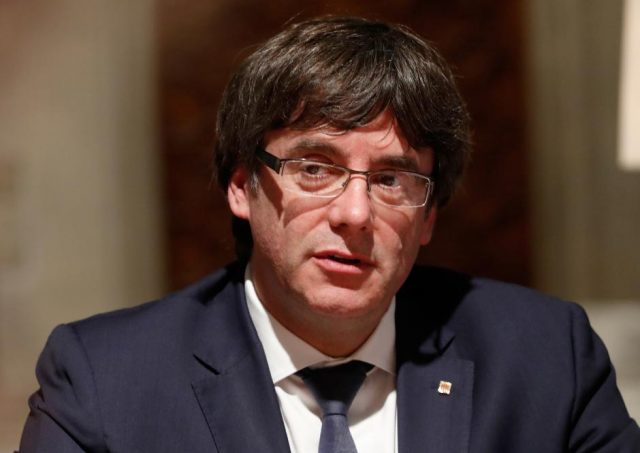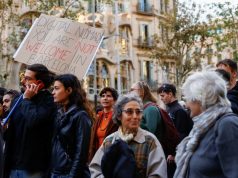BRUSSELS — (UPDATE – 927 a.m.) A Belgian judge has granted conditional release to sacked Catalan leader Carles Puigdemont and four of his ministers, and the group is scheduled to appear at court within 15 days, Belgian prosecutors said on Monday.
Puigdemont, who turned himself in to Belgian police after Spain issued a European arrest warrant for rebellion and misuse of public funds, is barred from leaving Belgium without a judge’s consent.
“The next step in the proceedings is the appearance of the five defendants before the Chambre du Conseil within the next 15 days,” prosecutors said in a statement.
Puigdemont and four associates turned themselves in to Belgian police on Sunday.
All are wanted by Madrid for actions related to the push for the region’s secession from Spain. Puigdemont has become the public face of that move for independence.
Other charges are the misuse of public funds, disobedience and breach of trust relating to the secessionist campaign, which has thrown Spain into a political crisis just as its economy has recovered from a sharp downturn and banking stress.
Madrid has taken over administrative control in Catalonia, until then an autonomous region, and called new elections on December 21.
Two polls on Sunday suggested pro-Catalonia independence parties will together win December’s regional election although they may fall just short of a majority of seats in parliament needed to revive the secession campaign.
Parties supporting Catalonia staying in Spain would divide seats but garner around 54 percent of the vote, the polls suggested.
Puigdemont traveled to Belgium shortly after Madrid took control. On Sunday morning, Puigdemont and four of his former councillors presented themselves to police in Brussels.
A judge will hear the defendants case on Sunday afternoon and has until Monday morning to decide whether the formalities for the extradition request have been fulfilled.
According to a GAD3 survey of 1,233 people conducted between Oct. 30 and Nov. 3 and published in La Vanguardia newspaper, pro-independence parties ERC, PDeCAT and CUP would take between 66 and 69 seats in the 135-seat parliament.
A second poll taken over the same period for the conservative newspaper La Razon echoed the GAD3 survey, showing pro-independence parties would capture the most votes though still fall just shy of a parliamentary majority with 65 seats.
Other seats would be generally divided between parties that support the region remaining as part of Spain, though they would run on separate tickets.
Voter participation, however, will rise to a record of 83 percent, the GAD3 poll showed.
Politicians on remand
Under the European arrest warrant system, the five defendants in Belgium can agree to an extradition order immediately or the judge can set bail or detain them. Belgian authorities have to inform their European counterparts if a European arrest warrant cannot be executed after 90 days.
On Saturday, Puigdemont — who PDeCAT said on Sunday would lead the party in the election — called for a united Catalan political front for independence from Spain and against the detention of his former members of government.
On Thursday, nine of his sacked cabinet were ordered by Spain’s High Court to be held on remand pending an investigation and potential trial.
One member of the dismissed cabinet, Santi Vila, was freed after paying bail of 50,000 euros ($58,035) on Friday. The other eight could remain in custody for up to four years.
According to the GAP3 survey, 59 percent believed legal action against Puigdemont was unjustified while 69.3 percent said the jailing of the Catalan politicians would give the independence cause a boost at the ballot box.
Catalan civic groups Asamblea Nacional Catalana and Omnium Cultural – whose leaders were imprisoned last month on sedition charges – called for a general strike on Nov. 8 and a mass demonstration on Nov. 11 to protest the detentions.
The Catalonia issue has sent shockwaves across Europe, energizing regions with their own secessionist agenda while unnerving those fighting to keep the European Union from fracturing further.
Belgian Interior Minister Jan Jambon, a member of the Flemish nationalist and separatist party N-VA, criticized Spain’s handling of situation on Sunday, saying Madrid “went too far” in an interview with Belgian broadcaster VTM.
Madrid says the judiciary acts independently of the legislative arm of government while adding that Catalonia leaders acted outside the rule of law when organizing the vote and making the declaration of independence.
Back to the start
A pro-secessionist rally in Barcelona on Sunday attracted just a few hundred people, a long way from the hundreds of thousands to join pro-independence marches in October. Many of those attending waved the regional flag and carried protest signs.
One protester, Antonia Aguilera, 63, said she was concerned the new elections would not be fair and would be manipulated by the Spanish government.
Her concerns echo the deep mistrust many Catalans have of politicians in Madrid that has deepened since the arrests and after the national police used truncheons and rubber bullets to thwart voting in the illegal independence referendum on October 1.
“I‘m disgusted by it all. We knew they would react but not as strongly as they did,” she said, adding that she believed the pro-independence parties would win the December election.
“And then we’ll be back where we started.”










